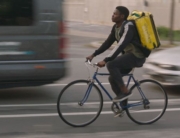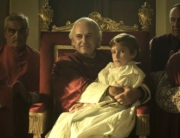The Italian filmmaker Matteo Garrone is probably best known for his 2008 masterpiece Gomorrah, a stark and unromantic exploration of the modern-day Mafia that pays particular attention to the allure that violence has for young people. This was executed in a style so chiseled, with such convincing, near documentary frankness, that it would have been hard to hold it against him if he’d made 10 more films just like it.
But, he did not. His filmography since then has signaled nothing if not a desire to avoid repetition, and even if there has been the occasional misfire (Tale of Tales), it has also been a testament to his incredible range. Reality was a painful, slightly surreal story about a fishmonger who dreams of appearing on a reality show, and it expertly illustrates the media’s false promises of wealth and attention. Dogman (my personal favorite) is a brutal revenge story shot with poetic intensity that does not leave us with sedate feelings about any of its characters. If the above seem united by an unflinching eye toward pain and suffering, he has proven himself equally at ease in the realm of fantasy with his 2019 adaptation of Pinocchio. This version had the bad luck to come out around the same time as several other Pinocchio adaptations.
With Io Capitano, he has shifted focus yet again, and for the first time away from Italy—though not completely. It begins in Dakar, Senegal, where two teenage cousins, Seydou (Seydou Sarr) and Moussa (Moustapha Fall), play music together and dream of stardom in Europe. They have been saving up for this occasion, secretly stashing money in the ground, and are not going to tell their families. Their rationale: They will make it big in Italy and bring home lots of money, so theoretically their success will outweigh the deception. Yet when Seydou does tell his mother (Ndeye Khady Sy), it doesn’t go so well.
Seydou sleeps in a small house in relatively cramped quarters with his mother and a slew of siblings, and he and Moussa work after school, so some level of poverty can be assumed. Yet this cinematic slice of Senegal is one rich with interpersonal connection. There is a certain tenderness to Seydou’s household in the way he and his sisters sleep piled up on the floor in a living room where moonlight leaks in. One early scene, in which Seydou and Moussa play drums for a festival, is euphoric. Here Garrone masterfully captures dancing bodies in action and the reciprocal energy between the crowd and the musicians. There are times that Garrone makes Senegal seem like a paradise the two teenagers don’t know they’re leaving behind. Nevertheless, they ignore the stern warnings of their elders (though they listen to a witch doctor who tells them they must go), pay for forged passports, and find themselves on a journey more traumatizing and life-threatening than anything they bargained for.
In telling this story, Garrone combines several elements. On one hand, he emphasizes the brutal realities that immigrants face, and there are many: long treks across the desert where those who collapse are simply left behind, abuse and torture at the hands of Libyan rebels (this is actually an understatement), the impossibility of getting medical care if you are undocumented, and the indifference of the Italian coast guard when contacted by a crew of starving immigrants. The above is, admittedly, a bit of a drive-by—viewers will need to see for themselves.
Garrone is scrupulous in his attention to the harrowing logistics of this journey. He has stated that his desire was to tell a story from the opposite angle that is usually told in Western media. Certainly, he has put in the work to make this story vivid. His strong eye, whether it is turned toward the unchanging desert as it shifts from day to night or focused on the sand-blown shack where fake passports get made, brings details brilliantly into focus. Two punishingly long sequences, in the desert and at sea respectively, purposefully test the viewer’s endurance.
Yet Io Capitano also has a fabular quality. This is not only because of a few surreal sequences in which Seydou has fatigue-induced dreams and visions. The film itself is structured much like a classic quest, with prophecies that are spoken, strange figures who are met along the way, and challenges to overcome, not unlike toned-down versions of the labors of Hercules, with improbable reunions and survivals. I am of two minds as to whether or not this approach has worked in Garrone’s favor. It does give the story a thrust and appeal that carries the viewer through many of the grisly details. Yet you could easily argue that the story demands nothing but realism. There were also times that I wondered whether the fantasies of Europe that the two teenagers have consumed justify the wild risks they don’t know they’re taking.
Yet the ending is so strong it casts doubts on any previous misgivings. It takes place on an overcrowded, precariously captained boat in the Mediterranean. In its clear-eyed view of human chaos, it is absolutely on par with the much-lauded town-hall scene in Cristian Mungiu’s R.M.N., though quite different in content. It confirms Garrone’s skill as an artist who is willing to look long and hard where others might be unwilling.





Leave A Comment